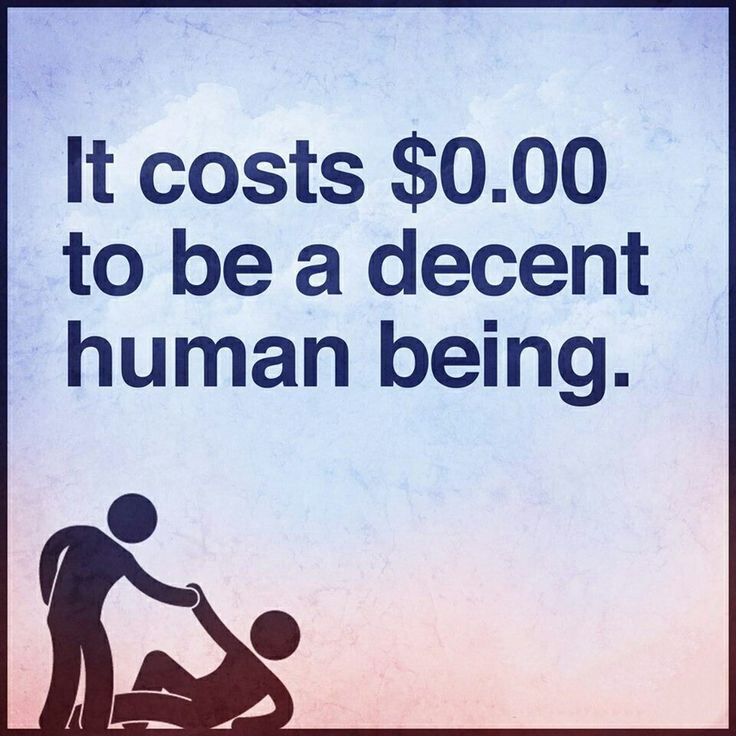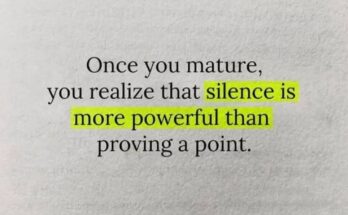
In a world that often emphasizes material wealth, power, and success, the simplest and most valuable qualities—kindness, respect, and decency—are sometimes overlooked. Yet, these qualities cost nothing. Being a decent human being requires no financial investment, no expensive education, and no privileged status. It simply demands mindfulness, empathy, and the willingness to treat others with dignity.
The phrase “It costs $0.00 to be a decent human being” reminds us that basic human decency is free yet invaluable. Whether in our personal relationships, workplaces, or interactions with strangers, treating others with kindness and respect should be the norm, not an exception. This article explores the importance of decency, the barriers that sometimes prevent it, and the ways we can cultivate a more compassionate world without spending a dime.
The Meaning of Decency
Decency is often described as behaving with fairness, kindness, and integrity. It means showing respect for others, regardless of their background, beliefs, or circumstances. It includes simple acts like saying “thank you,” holding the door open for someone, listening without interrupting, or offering help to those in need. While these gestures may seem small, they have a profound impact on individuals and society as a whole.
At its core, being a decent human being means acknowledging the humanity in others. It means treating people as we would like to be treated, following the golden rule of ethics found in cultures and religions worldwide. It doesn’t require wealth or status—only a genuine commitment to kindness and consideration.
Why Decency Matters
1. It Creates a Positive Ripple Effect
Small acts of decency have the power to create a ripple effect. When we treat others with kindness, they are more likely to pass it on. A simple smile, a word of encouragement, or an act of generosity can brighten someone’s day, which may inspire them to do the same for another person. Over time, these ripples build a more positive, compassionate society.
2. It Strengthens Relationships
Decency fosters trust and respect in relationships. Whether it’s in friendships, family dynamics, or professional environments, treating others with kindness leads to deeper connections. People are naturally drawn to those who make them feel valued and respected. In contrast, selfishness, arrogance, or rudeness create barriers that weaken relationships and breed resentment.
3. It Contributes to Mental and Emotional Well-Being
Scientific studies show that acts of kindness and decency boost mental and emotional well-being. Being kind releases endorphins, reduces stress, and improves overall happiness. Moreover, when people feel respected and valued, they are more likely to experience positive self-esteem and emotional security. A society that prioritizes kindness is one that fosters well-being for all.
4. It Costs Nothing but Means Everything
In a world where many things require money—education, healthcare, housing, and even basic necessities—decency remains one of the few invaluable qualities that cost absolutely nothing. It does not require financial resources, advanced knowledge, or special skills. It simply requires a conscious choice to treat others with respect, kindness, and empathy.
Barriers to Decency: Why People Struggle to Be Kind
If decency is free and beneficial to all, why do some people struggle to practice it? Several factors contribute to a lack of kindness and respect in society:
1. Stress and Personal Struggles
People dealing with stress, personal hardships, or mental health challenges may find it difficult to extend kindness to others. When overwhelmed by their own problems, they may lack the emotional capacity to be considerate. This does not excuse unkind behavior but highlights the importance of addressing personal struggles to foster a culture of decency.
2. Cultural and Social Norms
Certain environments and cultures may prioritize competitiveness over compassion. In cutthroat work environments or highly individualistic societies, kindness may be perceived as weakness. These cultural influences can discourage people from practicing basic decency, fearing that it may put them at a disadvantage.
3. Lack of Awareness or Empathy
Some individuals may simply lack awareness of how their actions affect others. Empathy is a skill that requires cultivation. Without exposure to diverse perspectives or self-reflection, some people may struggle to understand why decency matters.
4. Negative Influences and Role Models
People are shaped by their surroundings, including their families, peers, and media influences. If someone grows up in an environment where rudeness, manipulation, or selfishness are normalized, they may replicate those behaviors. The good news is that people can unlearn negative habits and choose to act with decency, regardless of past influences.
Practical Ways to Be a Decent Human Being
Practicing decency doesn’t require grand gestures—it’s often the small, everyday actions that make the biggest impact. Here are practical ways to incorporate kindness and respect into daily life:
1. Practice Active Listening
Listening is one of the most valuable yet underrated skills. When engaging in conversations, make an effort to truly listen rather than just waiting for your turn to speak. Show genuine interest in others’ thoughts and feelings.
2. Express Gratitude
Saying “thank you” acknowledges the efforts of others and fosters appreciation. Whether it’s thanking a server, a colleague, or a family member, small gestures of gratitude go a long way in building positive relationships.
3. Offer Help Without Expecting Anything in Return
Helping someone does not have to be a grand act. Holding the door, offering directions, or simply being there for someone in need are all ways to contribute positively to the world.
4. Speak With Kindness
Words have power. Choosing words carefully, avoiding insults, and speaking with respect can prevent unnecessary conflicts and create a more harmonious environment.
5. Respect Differences
People come from different backgrounds, beliefs, and experiences. Even if we don’t agree with someone’s perspective, treating them with respect is essential to a functioning and inclusive society.
6. Apologize When Necessary
Nobody is perfect. If you make a mistake or hurt someone, a sincere apology can mend relationships and demonstrate humility.
7. Refrain From Judgment
Everyone has struggles that may not be visible. Instead of being quick to judge, try to approach situations with understanding and empathy.
8. Be Honest and Trustworthy
Integrity is a core component of decency. Being honest, keeping promises, and acting with sincerity foster trust and respect in all relationships.
The Role of Decency in Society
A world where more people prioritize decency would be a world with less conflict, division, and hostility. Kindness, respect, and understanding contribute to a society where individuals feel valued and safe. Decency is essential in various areas, including:
1. The Workplace
In professional settings, decency fosters teamwork, productivity, and a positive work culture. Employees who feel respected and appreciated are more engaged and motivated.
2. Politics and Leadership
Leaders who act with decency inspire trust and unity. Political discourse that values respect over hostility can lead to more productive discussions and effective governance.
3. Education and Schools
Teaching children the importance of kindness and respect helps shape future generations into more empathetic and responsible individuals.
4. Social Media and Digital Interactions
The anonymity of the internet sometimes brings out the worst in people. Practicing digital decency—avoiding cyberbullying, spreading positivity, and engaging in respectful discussions—can help create a healthier online environment.
Conclusion
Being a decent human being costs nothing but can change everything. It does not require wealth, status, or extraordinary effort—just the simple decision to treat others with kindness and respect. By choosing decency in our daily interactions, we contribute to a world that is more compassionate, understanding, and harmonious.
Each small act of kindness has the power to create a ripple effect, inspiring others to do the same. While we cannot control the actions of others, we can control our own choices. Let’s choose to be decent—not because we have to, but because it makes the world a better place for everyone.


